

TopLink Developer Guide. Oracle Application Server Wiki. In computing, the Oracle Application Server 10g (the "g" stands for grid)[citation needed] (short Oracle AS), consists of an integrated, standards-based software platform.
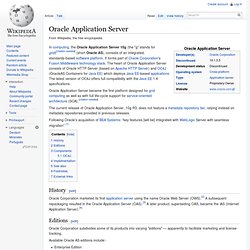
It forms part of Oracle Corporation's Fusion Middleware technology stack. The heart of Oracle Application Server consists of Oracle HTTP Server (based on Apache HTTP Server) and OC4J (OracleAS Containers for Java EE) which deploys Java EE-based applications. The latest[update] version of OC4J offers full compatibility with the Java EE 1.4 specifications. Oracle Application Server became the first platform designed for grid computing as well as with full life-cycle support for service-oriented architecture (SOA). [citation needed] The current[update] release of Oracle Application Server, 10g R3, does not feature a metadata repository tier, relying instead on metadata repositories provided in previous releases.
History[edit] Editions[edit] Database Downloads. Installing Oracle Database 10g Release 2 on Linux x86. Toby's PL/SQL Editor Plugin. DBMS_LOB: PSOUG tutorial on this oracle package. >> Actually, I have already done my own tests and it doesn't.
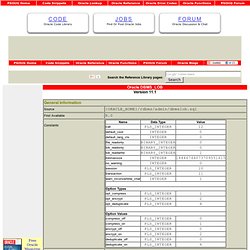
>> I can only retrieve 4000 as you already mentioned as >> opposed to the 64000 we're used to, but I think that this >> is a good trade off considering that we were doing almost >> 5000 queries at a time. Perhaps you could consider tuning the temp tablespace extent size to retain the ability to fetch 64000 bytes. Oracle: DBMS_LOB - package to manage all aspects of BLOBS, etc. The DBMS_LOB package provides subprograms to operate on BLOBs, CLOBs, NCLOBs, BFILEs, and temporary LOBs.
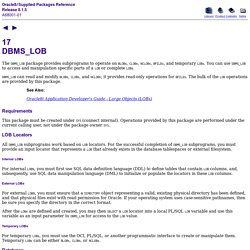
You can use DBMS_LOB to access and manipulation specific parts of a LOB or complete LOBs. DBMS_LOB can read and modify BLOBs, CLOBs, and NCLOBs; it provides read-only operations for BFILEs. The bulk of the LOB operations are provided by this package. Requirements This package must be created under SYS (connect internal). Overloading Procedures in PL/SQL. A FAQ that I get, well, frequently, is about overloading procedures.
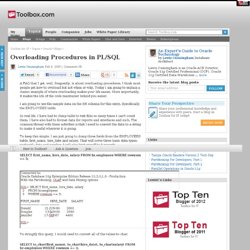
I think most people get how to overload but not when or why. Today I am going to explain a classic example of where overloading makes your life easier. More importantly, it makes the life of the code maintainer behind you easier. I am going to use the sample data on the HR schema for this entry. Specifically, the EMPLOYEES table. Partitioning in Oracle 9i, Release 2 - Part 1. XDK Sample - PL/SQL - XML Schema. XML Parser for PL/SQL. Oracle9 i XML Developer's Kits Guide - XDK Release 2 (9.2) Part Number A96621-01 Using XML Parser for PL/SQL Examples in the Sample Directory Frequently Asked Questions About the XML Parser for PL/SQL Frequently Asked Questions About Using the DOM API. Oracle DBMS_XMLGEN XML. Oracle Index Organized Tables IOT. DBMS_XMLSAVE - Saving XML into an Oracle database. Oracle9i Parse XML Documents. Related articles.
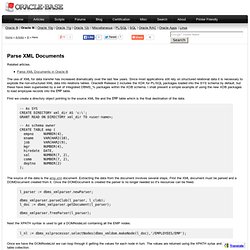
Parse XML Documents in Oracle 8i The use of XML for data transfer has increased dramatically over the last few years. Since most applications still rely on structured relational data it is necessary to explode the non-structured XML data into relations tables. Oracle9i Release 2 includes the XDK for PL/SQL packages loaded into the SYS schema by default, but these have been superseded by a set of integrated DBMS_% packages within the XDB schema. I shall present a simple example of using the new XDB packages to load employee records into the EMP table. First we create a directory object pointing to the source XML file and the EMP table which is the final destination of the data. Oracle Data Types. Data types for Oracle 8 to Oracle 11g Notes and Examples VARCHAR2: Storing character data as Varchar2 will save space: Store 'SMITH' not 'SMITH ' Oracle9i and above allow Varchar2 columns to be defined as a number of bytes VARCHAR2(50 BYTE) or a number of characters VARCHAR2(50 CHAR), the latter is useful if the database is ever converted to run a double-byte character set (such as Japanese), you won't have to edit the column sizes.
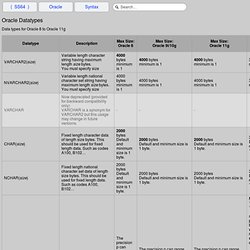
The default measure, normally BYTE, is set with nls_length_semantics. Version control of database objects? Killing Oracle Sessions. There are a number of ways to kill rogue sessions both within Oracle and externally.
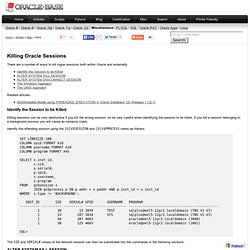
Related articles. Multithreaded Model using THREADED_EXECUTION in Oracle Database 12c Release 1 (12.1) Identify the Session to be Killed Killing sessions can be very destructive if you kill the wrong session, so be very careful when identifying the session to be killed. If you kill a session belonging to a background process you will cause an instance crash. Identify the offending session using the [G]V$SESSION and [G]V$PROCESS views as follows. SET LINESIZE 100 COLUMN spid FORMAT A10 COLUMN username FORMAT A10 COLUMN program FORMAT A45 SELECT s.inst_id, s.sid, s.serial#, p.spid, s.username, s.program FROM gv$session s JOIN gv$process p ON p.addr = s.paddr AND p.inst_id = s.inst_id WHERE s.type ! The SID and SERIAL# values of the relevant session can then be substituted into the commands in the following sections. The basic syntax for killing a session is shown below.
Oracle Bind variables - The key to application performance. PLSQL Topics. Oracle is a relational database technology developed by Oracle.
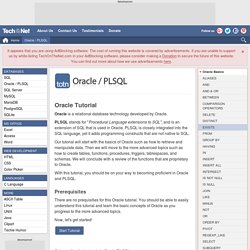
PLSQL stands for "Procedural Language extensions to SQL", and is an extension of SQL that is used in Oracle. PLSQL is closely integrated into the SQL language, yet it adds programming constructs that are not native to SQL. Our tutorial will start with the basics of Oracle such as how to retrieve and manipulate data. Then we will move to the more advanced topics such as how to create tables, functions, procedures, triggers, tablespaces, and schemas.
We will conclude with a review of the functions that are proprietary to Oracle. Life After Coffee. Oracle XML Cheatsheet.